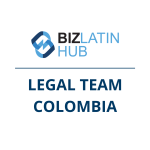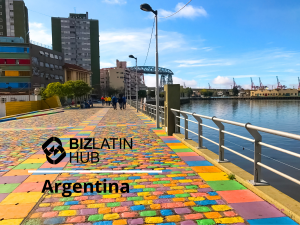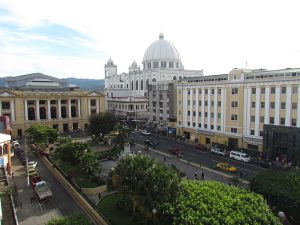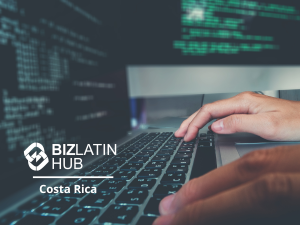The ongoing tech revolution has caused explosive, significant disruptions in traditional, fundamental sectors to national economies worldwide, and is showing no sign of slowing down. With its velocity, it impacts almost every industry on the planet, including oil and gas.
At such a speed, it is almost impossible to understand all the effects, benefits and challenges that this industry revolution has had, and will continue to have on human capability, society, work opportunities, and the national and global economy. In an enterprising manner, observers try to capture it all and outline the opportunities for investors in oil and gas. We’re going to explore the impact of technology on oil and gas companies, and government legislation providing the building blocks to introduce innovation to the sector.
Colombian O&G Opportunities – Discussion in three parts

This series, “Colombian Oil and Gas Companies amidst the Tech Revolution” is divided into 3 parts.
Part 1 is an overview of the oil and gas industry and its reaction to the tech revolution. We reflect on how long hydrocarbons will be a part of our lives, discuss challenges the oil industry is facing as it transforms, and apply this to the role of technology in Colombia’s upstream, midstream, and downstream elements.
In Parts 2 and 3, we discuss how certain pacts made in the government’s National Development Plan can benefit the oil and gas industry and how it can contribute to Colombia’s social and economic development. Specifically:
- Part 2 lays out a general view of Latin America in the context of increasing digitalization, followed by a focus on Colombia. We introduce the government’s National Development Plan, including the Science, Technology and Innovation Pact, Digital Transformation Pact, and Mining and Energy Resources Pact.
- Part 3 goes more in-depth, putting theory into practice, contrasting these intersecting pacts that include the government’s objectives and how it intends to achieve them. We apply these pacts to the development of the Colombian oil and gas sector.
The arrival of new forms of energy
There has been plenty of discussion among experts around the globe regarding when hydrocarbons will give way to new sources of energy. Climate change, the increase of technological developments in alternate energies, the presence of electric cars, and environmental pressure to cease hydrocarbons use trigger such discussions. At least over the next decades, while we transit to new forms of energy, hydrocarbons will still be an essential part of our lives, and continue to support the global economy.
The US Global Energy Institute highlights that: “Combined petroleum, natural gas, and coal use is forecast to grow 16% between 2017 and 2040. Each of these fuels is expected to grow, but at very different rates, led by natural gas at 43%, petroleum at 10%, and coal at 2%. Although the share of total global energy demand met by fossil fuels is forecast to decline by 2040, hydrocarbons still are expected to account for 74% compared to 81% in 2017. While the share of total demand from natural gas increases in 2040 compared to 2017 (by 3 percentage points), the share from oil and coal each decreases (by 4 and 5 percentage points, respectively).”
Reflecting on traditional energy sources
In the meantime, the search for different ways to find oil and gas, production optimization, artificial systems, and the reduction of operation and production costs has also become more challenging. Oil and service companies are encouraged to innovate, offering new services and products, to create new technologies, and to continue investing in research and development. The opportunity to find new reserves arises mainly from unconventional reservoirs, deep off-shore exploration, and enhanced recovery.
Slow on technological uptake and innovation
Traditionally, the oil industry has been slow to adopt new technologies, and the innovation cycles have also been slow to activate due to:
- uncertainty in oil prices and its fluctuations
- vast amounts of capital required to carry out the business; it’s high risk, and a long wait to get full returns on investment
- the industry’s high-intensity nature of capital and its conservative way of acting for what has worked in the past
- the innovation cycle is longer than that of similar industries in the energy sector and other industries
- new generations are afraid to try new technologies due to a fear of failure and older generations are worried about losing their technical credibility.

Recent financial challenges caused mainly by the oil price crisis that began in 2014 drove significant cost-cutting measures for the companies. However, this also meant that companies quickly sought out new technologies to allow them to be more efficient and cost-effective. Today, the oil price has stabilized, and the oil companies that survived are conservative about conducting business and adopting new technologies.
Research and development in the oil and gas industry
Experts maintain that the oil and gas industry is transforming based mainly on the following facts:
- the “easy oil” in most of the world has already been exhausted
- new resources are in harder-to-reach and harsher environments
- there is a declining production quantity from older reservoirs
- energy demand and competition is increasing
- there is a need for sustainable operations
- primary safety measures are increasing, due in part to environment challenges triggered by natural disasters.
The oil and gas industry is also facing several challenges, all of which are causing such a transformation. This includes:
- climate change
- new ways to explore and exploit
- incorporation of new and cleaner energies to prepare for a long-term energy transition
- more stringent environmental terms and social demands
- the difficultly the oil and gas companies are having in recruiting millennials, in view of their desire to work in green energies.
This transformation brings about the need to find new technologies to explore and produce hydrocarbons to increase and sustain the world’s reserves.
There is no doubt research and development (R&D) have helped reduce these challenges. Investment in R&D has resulted in new technologies. Companies have reactivated non-economic fields, hostile, and complex environments to being conquered. Activities in unconventional resources have brought a new horizon.
Therefore, research and development (R&D) investments should continue and increase to create new and improved technologies for the oil and gas industry.
Digital transformation in the oil and gas industry
According to market observers, the oil and gas sector has not yet taken advantage of using data and technology in more meaningful ways. Digital technologies still need to be exploited to drive the sector’s transformation as a game-changer for reducing costs and human error, and increasing productivity.
Although this has been true, the facts mentioned above are increasingly turning the oil and gas industry towards the use of digitalization. Studies show that these companies are mainly interested in developing and using newer technologies such as the Internet of Things, artificial intelligence, big data and, robotics.
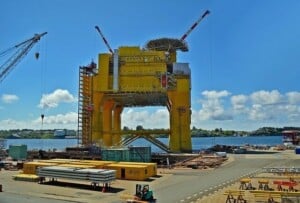
These technologies reduce costs, increase efficiencies, and provide operating personnel with sufficient data and analytics to perform their work better.
Digitalization benefits
The oil and gas industry should increase its investment in digital technologies, given that it has the following benefits:
• When used effectively, digital technologies can increase productivity, efficiency, and agility. Technical and business decisions are then made in a more precise manner and therefore are more reliable.
• Greater technological sophistication can offer cost reduction by using real-time data which in turn allows operators to improve maintenance and inspections. Also, operators can detect underperforming wells and anomalies during drilling operations, reducing high-cost issues.
• Data can support better monitoring of equipment, together with their safety performance that may mitigate, predict, and control risks and failures.
• Smaller solution specialists are replacing larger generalists and are tailoring packages to suit companies’ needs directly.
Colombia in the Tech Revolution
The Colombian government strategies for the upstream oil industry include:
• the promotion of offshore projects for development in the Caribbean Basin,
• Improved recovery, by promoting new technologies, (chemical and thermal processes), and incremental production incentives.
• implementation, and the use of fracking technology for unconventional reservoirs to increase reserves. (currently suspended by Council of State decision, except for pilots for investigation purposes).
Oil and gas exploration is necessary. Adding new reserves to the country is critical to reverse today’s very short production-to-reserves ratio.
Hence, technology is vital; each activity will no doubt have an impact on the environment, and on society, so there is a need for many technological tools.
Colombia’s upstream, midstream and downstream
Despite existing activities, exploration, production, and sufficient infrastructure in pipelines, refineries and fuels, Colombia’s upstream, midstream, and downstream face challenges and can certainly benefit from the use of new technologies, innovation, and digitalization. We outline a few of these below.
Upstream exploration development
The oil and gas sector in its upstream is made up of exploration and production phases. Both require high-quality equipment, tools, technologies and expertise.
But determining where oil and gas can be located in the earth is the first step to finding oil and being able to produce it. Therefore, the exploration phase is of the utmost importance.
“The discovery frequency has increased. One important reason for the increase is new developments in exploration technology. There have been significant improvements in the collection, processing, and the interpretation of seismological data. The most important improvement in the exploration phase has been the change from 2D to 3D technology. Faster computers and software innovations have contributed to better interpretation and decisions prior to decisions to drill for oil and gas”.
The country has benefited from discoveries since the companies have had higher possibilities of finding hydrocarbons.
Midstream: making transportation more efficient
Focus on heavy oil increased in Colombia:
- following exploration activities that resulted in several heavy oil discoveries, and,
- because one of the heavy oil fields in Colombia is most relevant in terms of production.
Today, 42% of the current daily oil production in Colombia is heavy oil. Therefore, crude evacuation through the country’s pipeline infrastructure is a challenge because, in the past, the pipelines had primarily transported lighter oils.

Also, a significant portion of heavy oil is trucked from unconnected fields to loading facilities into pipelines. Effective management of combined truck and pipeline transport requires anticipation of potential ability and restrictions in both systems and their cross relationship. Today, through extensive historical data analysis technologies, it is possible not only to anticipate but also to develop short-term strategies to optimize transport management capacity and costs.
Heavy oil represents an enormous challenge for companies from a commercial and technological point of view. Transportation, processing, and refining of this liquid petroleum is more complex than that one of the lighter crudes.
By adding diluents to heavy oil, it became lighter, so transportation became more efficient. However, efforts are being made to apply new technologies such as friction reducers and inline warming of the crude, to make it lighter.
On the gas side, implementing the so-called virtual gas pipelines will enable the movement of gas from remote fields to existing pipelines that will reach final consumers, or bring gas to final consumers that are not connected to pipeline networks.
Gas virtual pipelines today are based on compressed natural gas. In the future, these will evolve towards liquefied natural gas (LNG).
Downstream: refineries and fuels
In the downstream, a significant impact was the construction of the new Cartagena refinery. It can obtain products and sub-products from refining processes, with the highest safety standards, the latest technology, and it is considered one of the most modern refineries. The new refinery has also reduced the imported fuel volumes and now uses more local fuel volumes.
The world tendency is to produce clean fuels that contribute to improved air quality.
The other important refinery, the one in Barrancabermeja, also has a hydrotreatment plant for gasoline and diesel that also produces cleaner fuels.
Modernization of the energy sector

Investing in new technologies and innovation is fundamental for the modernization of the energy sector, and is key to reducing accidents and costs, and increasing efficiency and optimization, allowing for sustainable development.
In Part 2, we will briefly review Latin America in the fourth revolution context, followed by a focus on Colombia. We’ll include a description of the government’s National Development Plan, and outline its science, technology and innovation, digital transformation, and mining and energy resources pacts.
Contact us for more information
We’re following the oil and gas industry with great interest. If you’re looking to expand into this transforming sector, get in touch with leading legal and accounting experts in this space.
At Biz Latin Hub, our Colombian headquarters stays on the pulse of oil and gas trends. Our team of local and expatriate professionals can guide you through company formation and ongoing operational compliance requirements to ensure your company gets the best start in this exciting sector.
Reach out to us here for more information about our suite of market entry and back-office services, and the integral role we can play in your company expansion.

